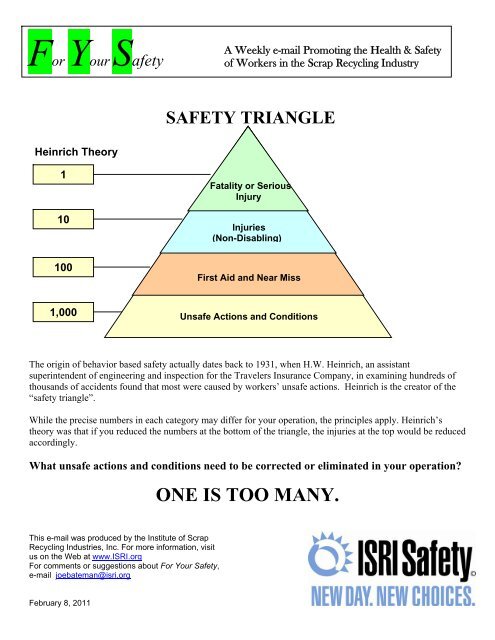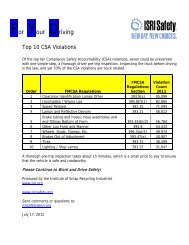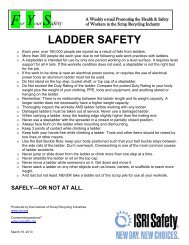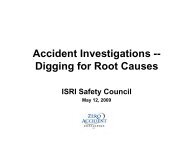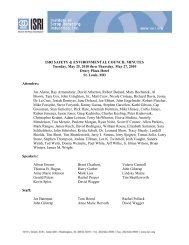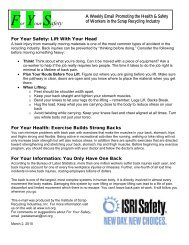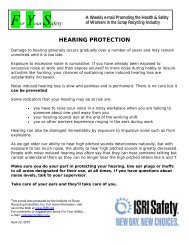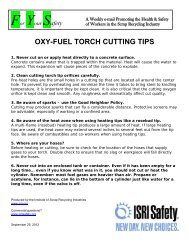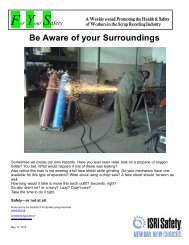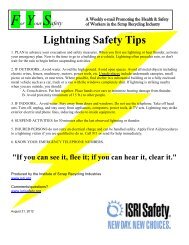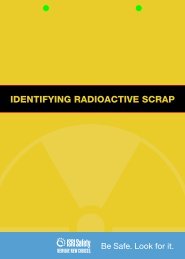ONE IS TOO MANY. - ISRI Safety
ONE IS TOO MANY. - ISRI Safety
ONE IS TOO MANY. - ISRI Safety
Create successful ePaper yourself
Turn your PDF publications into a flip-book with our unique Google optimized e-Paper software.
For Your <strong>Safety</strong><br />
A Weekly e-mail Promoting the Health & <strong>Safety</strong><br />
of Workers in the Scrap Recycling Industry<br />
SAFETY TRIANGLE<br />
Heinrich Theory<br />
1<br />
10<br />
Fatality or Serious<br />
Injury<br />
Injuries<br />
(Non-Disabling)<br />
100<br />
First Aid and Near Miss<br />
1,000<br />
Unsafe Actions and Conditions<br />
The origin of behavior based safety actually dates back to 1931, when H.W. Heinrich, an assistant<br />
superintendent of engineering and inspection for the Travelers Insurance Company, in examining hundreds of<br />
thousands of accidents found that most were caused by workers’ unsafe actions. Heinrich is the creator of the<br />
“safety triangle”.<br />
While the precise numbers in each category may differ for your operation, the principles apply. Heinrich’s<br />
theory was that if you reduced the numbers at the bottom of the triangle, the injuries at the top would be reduced<br />
accordingly.<br />
What unsafe actions and conditions need to be corrected or eliminated in your operation?<br />
<strong>ONE</strong> <strong>IS</strong> <strong>TOO</strong> <strong>MANY</strong>.<br />
This e-mail was produced by the Institute of Scrap<br />
Recycling Industries, Inc. For more information, visit<br />
us on the Web at www.<strong>IS</strong>RI.org<br />
For comments or suggestions about For Your <strong>Safety</strong>,<br />
e-mail joebateman@isri.org<br />
February 8, 2011
Para Su Seguridad<br />
Correo electrónico semanal para promover la<br />
salud y la seguridad de los trabajadores de la<br />
industria de reciclaje de chatarra<br />
Teoría de Heinrich<br />
TRIÁNGULO DE LA SEGURIDAD<br />
1<br />
10<br />
Accidentes fatales<br />
o lesiones graves<br />
Lesiones<br />
(que no causan discapacidad)<br />
100<br />
Primeros auxilios y casi accidentes<br />
1,000<br />
Condiciones y acciones inseguras<br />
El origen de la seguridad basada en el comportamiento se remonta a 1931, cuando H.W. Heinrich, supervisor<br />
auxiliar de una compañía de seguros de viaje, mientras examinaba cientos de miles de accidentes, descubrió que<br />
la mayoría de ellos eran causados por acciones inseguras por parte de los trabajadores. Heinrich es el creador<br />
del “triángulo de la seguridad”.<br />
Si bien los números exactos en cada categoría pueden diferir con respecto a sus operaciones, los principios aún<br />
se aplican. La teoría de Heinrich consistía en que si se reducían los números en la base del triángulo, las<br />
lesiones en la parte superior del triángulo se reducirían de manera proporcional.<br />
¿Cuáles son las condiciones y acciones inseguras que deben ser corregidas o eliminadas de<br />
su operación?<br />
UNA YA ES DEMASIADO.<br />
Este correo electrónico fue elaborado por el Institute of Scrap<br />
Recycling Industries, Inc. Para obtener más información, visite<br />
nuestro sitio web en www.<strong>IS</strong>RI.org<br />
Para comentarios o sugerencias relacionados con Para Su Seguridad,<br />
envíe un mensaje de correo electrónico a joebateman@isri.org<br />
8 de febrero de 2011
For Your <strong>Safety</strong>/For Your Driving<br />
Training Session Sign-In Sheet<br />
Topic_________________________________________<br />
Instructor____________________________________<br />
Location______________________________________<br />
Date ___________________________
Para Su Seguridad/Para Su Conducción<br />
Hoja De Inscripción Para La Sesión de Capacitación<br />
Tema_________________________________________<br />
Instructor____________________________________<br />
Ubicación_____________________________________<br />
Fecha ___________________________


